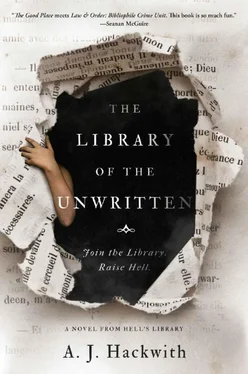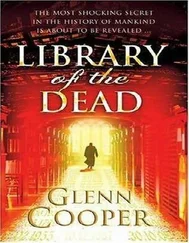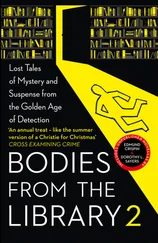Claire flipped open the cover and held the glowing lighter up. Leto craned to see. The title page was intact, thick vellum tinged a buttery color even in the blue light. But as Claire lifted the page, a jagged edge came into view. Several pages, a dozen or more, had been torn from the front of the book. They’d been ripped roughly, in some places torn deep into the binding, exposing dark scarlet veins of thread. The remaining text picked up midsentence, and each word trembled on the page.
Brevity gasped. Leto noticed Claire’s shudder only because it made her braids tremble. Claire took in a sharp breath and held the ghostly lighter closer for inspection. Her lips parted, and she muttered words Leto couldn’t understand as she studied the grisly remains of the first pages of the book. The hero crossed his arms and slumped slightly against the bricks, unperturbed as she gingerly closed the book. Her voice was pinched with the kind of quiet one used around a terminal patient.
“You ripped out your own pages.”
“I did,” the hero said.
“That would have been… painful.”
“It was.”
“Self-mutilation.” Claire shook her head. “You’re a book. What can you possibly hope to gain?”
“Everything.” A fine sweat broke out on the hero’s forehead, gleaming in the dim light and plastering the tips of his bronze hair to his temples. His words were fevered. “I can see it in her eyes, Librarian. She’s so close to it! She wants to write, she needs it, and she doesn’t even know it!”
“It’s not your—”
“It’s cruel. You say it’s cruel to visit my author when I am unwritten. But I find it monstrous how you allow these authors to suffer. And yes, allow their stories to suffer as well. To live these half-lives, stories and authors, wearing holes in their souls that hold the shadow of other worlds they’ll never see. When you could so easily help them. Ask your muse here!”
The hero sank more heavily against the brick. “One word, one hint, one familiar face in a coffee shop. If I can inspire her to write and make us real… you should be freeing your entire library. Introducing books to their authors, not jailing them. If it gets them to write and gives worlds a chance to live…”
He made a guttural sound in his throat. “Who are you to stop them? Or must every author fail so they can be just as miserable as you?”
Brevity gasped as if the hero had struck a blow, but Claire’s expression faded from anger to concern. “Hero.” Her brows knit together as she watched the unwritten man, who was sweating profusely now. “Tell me what you’re… feeling.”
The hero looked pale, much too pale. Claire gestured, and Leto quickly went to the hero’s side, gripping him under one elbow. He was surprisingly light. The hero grimaced at his touch. “I’m… fine. It’s just damnably hot here, and… where—where was I?”
A tremor shot through the man’s body. His brow furrowed, then smoothed to distant dismay. “Oh dear. The pages. I think she’s burning them.”
And with that, the hero fainted onto the concrete.
A stunned silence, then Brevity spoke.
“Well, he did break up with her.”
5
RAMIEL

We think stories are contained things, but they’re not. Ask the muses. Humans, stories, tragedies, and wishes—everything leaves ripples in the world. Nothing we do is not felt; that’s a comfort. Nothing we do is not felt; that’s a curse.
Librarian Poppaea Julia, 50 BCE
RAMIEL TRANSPORTED HIMSELF DIRECTLY to the dead man’s living room. The rush of air that accompanied his arrival sent up a burst of dust and fluttering papers. Mr. Jonathan Avery had not been a tidy man toward the end of his life. His Seattle apartment perched at the top of a very trendy tower downtown, but inside was a study in crumpled bags and stacks of papers.
Still, Rami thought he could detect a modicum of reason in the stacks lining every available surface of the accountant’s apartment, sprawled with the minutiae of a life of numbers and details. Dust came away on Rami’s hand as he thumbed open a cabinet.
Avery hadn’t given him much to go on, even after Uriel’s prodding. Upon arrival in Heaven, souls were frequently fuzzy on the details of their lives. The whole business of death was traumatic, so temporary amnesia often helped new arrivals adjust to their afterlives. It was a testament to the man’s desperation that he even remembered what the scrap of paper was.
Which is why Ramiel was on Earth, scrounging around a dead man’s apartment for clues. Uriel opted to stay behind and try to draw more answers from Avery. Rami suspected that had less to do with sympathy for the dead and more to do with Uriel disliking modern-day civilization. Rami had the impression that Uriel took the development of human curiosity as terribly inconvenient altogether. She’d never had much use for humans beyond what function they had to please her Creator.
For Uriel, humans were cut flowers for a lover’s bouquet, nothing more.
A superficial sweep turned up little but week-old newspapers and sour milk, and a laptop buried beneath a tilting cliff of paper. He understood these sleek devices were the nexus of modern human lives, the modern confessional, but it would not give up its secrets for him. Luckily, he was less interested in Avery’s secrets than in Hell’s. There were more traditional ways to track nonhuman artifacts. He crossed the apartment to open the sliding door that led to a shriveled excuse for a balcony, then carded his fingers through his feathered coat until he found an appropriate sacrifice. Wincing as it came free, he shielded the feather from the wind in the cup of his palm.
Uriel had said that the scrap came from a book created for Lucifer’s realm. Rami did not know this cartoonish “devil” that terrorized modern imagination, but he knew Lucifer. He was a selfish angel and likely an even more selfish demon. If something of his was missing, his servants might have already been dispatched to retrieve it. They would have a head start, possibly in this very city, would possibly even have the book already. If Rami could intercept them, he could keep a powerful tool out of evil’s hands and end this before any harm could be done.
Rami withdrew a silver compass from his pocket and brought it up to the feather he sheltered in his hand. He bent, muttering a few sparse words until a faint white light hummed between compass and feather. As with ink seeping from quill shaft to tip, the feather slowly changed into a deep, pitiless black. Tainted, like the quarry he sought.
Rami let the feather flutter off the balcony, then retreated inside to watch the compass in his hands. The next time the demons moved, to or from this city, he’d have them. He just had to wait.
Rami was good at waiting.
6
LETO

Books and stories are the creations of imagination, and that power is just for humans. Take it from me. Gods can will a realm into being, and muses can try to edge things along, but only a mortal can imagine a different way for the story to go. How cool is that? Humans are freaking terrifying. I love it!
Apprentice Librarian Brevity, 2014 CE
“BALLS,” CLAIRE MUTTERED.
As soon as the hero collapsed, the librarian instructed Leto to hoist his legs. It was a waddling walk to drag the prone man farther into the alley where no passing tourists would notice. Despite being surprisingly light, the hero was tall, with long arms and legs that Leto found impossible to corral. Leto grimaced as they hit another trash can that boomed loudly in the darkness.
Читать дальше














